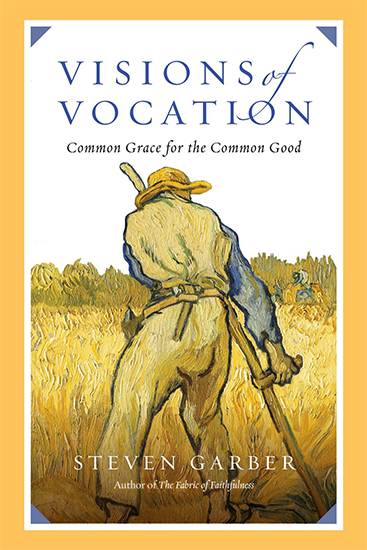For today’s Blood:Water Book Club, we will review chapters 1-3 of Visions of Vocation by Steve Garber.
Summary:
Any understanding of vocation begins with paying attention, with having eyes that see with the heart. The world around us has moments that are outrageous, that pierce the soul, that bring tears of sorrow, grief, anger, or joy. We are tempted to respond with a simple, numb, “Whatever,” and move on. Yes, we may be “moved,” but we are inclined to step back and disengage. The challenge is to step into the brokenness for love’s sake, to know what we know, and then “come and see” as we grow in our vocations. Will we respond with ordinariness and thoughtlessness like Adolph Eichmann, in effect saying, “It’s not my fault—I didn’t do it.”? Or will we feel our responsibility and take action? One of the best ways to read a culture is to “read” the art of that culture—the songs, novels, quotations, paintings, portrayals, and movies. If our current landscape can be described as info-glut, numbing, overwhelming, trapping… how should we respond? What does faithfulness and stewardship look like?
Themes:
Responsibility and implication; Sacramental learning; Knowing the brokenness of the world and relationships around you, can you still respond with love and hope?
Powerful Lines
- “We learn the truest truths, the most important things, only when we look over the shoulder and through the heart, only when we can see that ideas have legs and that worldviews can become ways of life.” (28)
- “We know in our deepest places how hard it is to keep our eyes open to the complexity of the broken world around us, to keep feeling the pains of a world that is not the way it is supposed to be and, knowing the difficulty, choosing to engage it rather than being numbed by it.” (53)
- (observing our current culture/landscape) “In a post-Enlightenment world, there is no voice, no perspective that carries more weight than any other, because no one has access to certainty about anything. There is no Story to make sense of stories, no Truth to make sense of truths, no Metanarrative to make sense of narratives. All claims to the contrary are “totalitarian” and are not to be tolerated. The worst face of postmodernism is that nothing has metaphysical or moral weight; it is the culture of whatever, a nihilism for Everyman.” (73)
Questions to Ponder:
- Where are you feeling challenged to “come and see,” to press into the messiness and complexity of relationships and responsibilities?
- Where have you experienced sorrow recently? Anger? Disappointment? Reflect on why you responded in this way. What would a response of love look like?
- Where in your day-to-day activities are you prone to respond with “whatever”? What triggers you to respond with “whatever” in the news? In your social media feeds? In your family?
Challenge:
As you engage in the art around you (ex. browsing the web, listening to music, reading books, watching TV/movies, Pinterest), pay attention to your responses. Change your routine and habits to cultivate a healthier and more enduring worldview.

